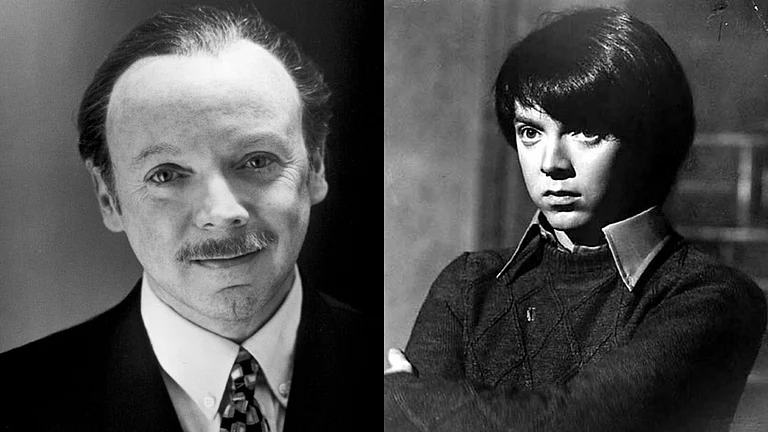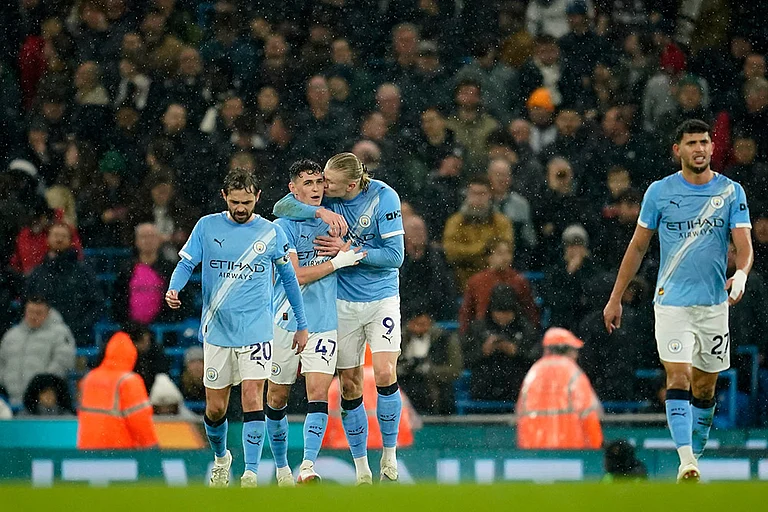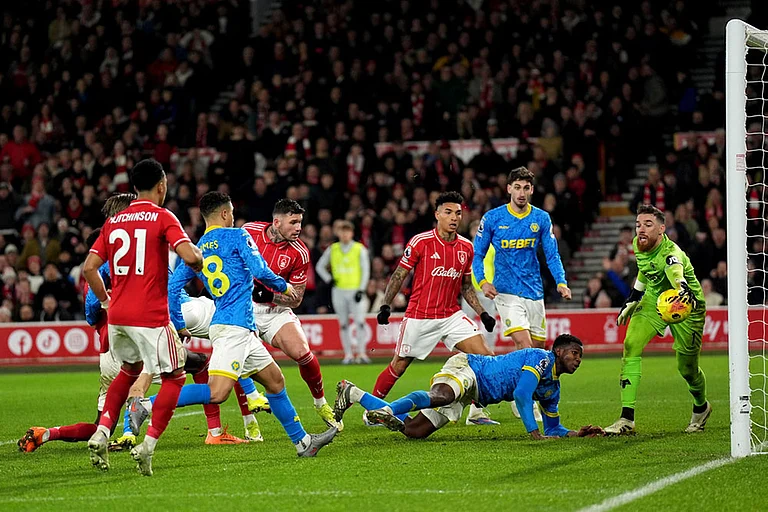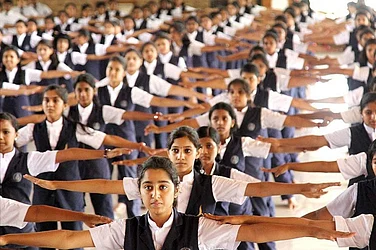Nearly a fortnight after the gruesome killing of 44-year-old tailor Kanhaiya Lal in Rajasthan’s Udaipur, the tourist town in Rajasthan has inched back to normalcy. But tense shadows of the past week’s violence prevail in pockets of the city even as protests from Hindu organisations demanding justice against the communal killing continue. Members of several religious and caste organisations have been regularly agitating outside the Collector’s office and other strategic locations in Udaipur. The protests have now spread to Udaipur and other parts of Rajasthan as well. And in several reported instances, communal slogans against Muslims were raised.
“What happened with Kanhaiya Lal was not just a killing, it was jihad. We don’t feel safe anymore,” says Kundan Chauhan, a local Hindu leader who was seen leading rallies and mobilising local youth in Udaipur, days after the killing. Even with Section 144 CrPC and mobile internet shutdowns across parts of Rajasthan, thousands of protesters, led by a multitude of fringe organisations, took to the streets of the Old City as part of a “Maun Yatra”, which nevertheless kept raising communal slogans and demanding the hanging of the perpetrators. It did not end there. “In the name of tourism, several anti-national people enter this area and start living here. We want raids in these minority areas and the jihadis identified. They may be from Pakistan or Bangladesh, or Rohingya pretending to be Bengali. We must find out everything about the fundamentalist rackets running across Udaipur,” adds local resident and advocate Ganesh Chauhan.
Kundan Chauhan alleges that the "illegal immigrants" living in their vicinity make life tough and “unsafe” for Hindus. “We have complained to the prashashan several times, but they have done nothing. Now the community must unite to take action themselves,” Chauhan, who is a “senior member” of Sarv Hindu Parishad - an umbrella body of Hindu organisations including VHP, RSS and others, that had been at the forefront of protests across Rajasthan, tells Outlook.
Anger and Justice
The tourism-dependent town had come to a standstill on June 28, when two men slit the throat of tailor Kanhaiya Lal and posted videos of it online, in one of which they claimed to have killed him in response to an insult to Prophet Mohammad.
The two accused have been identified as Mohammad Riyaz Akhtari and Mohammad Ghaus. According to police, the duo killed Lal for allegedly sharing a social media post in support of BJP spokesperson Nupur Sharma. The duo was captured by the police just hours after the incident, followed by more arrests including two others named Mohsin and Asif, who allegedly helped the accused with planning and reconnaissance of Lal’s shop. Wasim Ali, who owned a chicken shop opposite Kanhaiya Lal’s shop, where he was killed, has been arrested as well and is one of the six suspects who have been sent to NIA custody till July 12. The NIA as well as the ATS are investigating the case for terror links after the accused were found to have links with Pakistan. Riyaz and Ghaus were thrashed by lawyers outside the special NIA court in Jaipur, where the case is being heard.
Chief Minister Ashok Gehlot visited Lal's family a day after the incident to express his condolences and to offer ex-gratia of Rs 50 lakh along with a permanent government job. Chatter about the CM arriving with a Rs 50 lakh cheque brought residents of Gully Number 14 in Govardhan Vilas Housing Colony, where Lal lived, to their windows and doorsteps. But the eyes that greeted the CM were filled with questions. How could this happen? Why have the killers not been “encountered” yet? Who is to blame? Why didn’t the police listen to Kanhaiya’s complaints, of feeling threatened?
According to locals and the police, Lal had been taken into custody just before his murder, after Muslims from the locality objected to his sharing a social media post in support of Nupur Sharma. He was bailed out the next day. His family claims that the Dhan Mandi police negotiated a compromise between the Hindu and Muslim sides, and Lal was asked not to open his shop for a few days. He was killed the day he reopened his shop after the seven-day lay-off.
Outside Lal's home, however, the CM’s assurances of a fair probe received lukewarm response from neighbours and residents. Slogans were raised demanding the case be handed over to ADG (Law and Order) Dinesh M.N., aka Rajasthan’s ‘Singham’ -- once an accused in the fake encounter case of Sohrabuddin Sheikh -- now an anti-corruption crusader. Inside Lal’s house, Lal’s wife Jashoda Bai keeps her husband’s shirts and clothes that he had sewn close to her. She says it makes him feel close to her.
“We don’t want money. We want justice,” Jashoda Bai tells Outlook. Her family says she hasn’t eaten since the day her husband was killed in broad daylight. “He had no enemies; he was a simple man. He went to work and came back home, was never part of any protests or activities. He didn’t even share the post. I don’t know who did,” Jashoda adds.

In previous statements to the media, Lal’s family had claimed that a child had shared the post, but now they say it could have been anyone. “Does it even matter?” asks Lal’s 20-year-old son Yash, who has become the de-facto head of the family. The final year engineering student appears overwhelmed, with the string of mediapersons coming in and asking him to repeat his ordeal. But he maintains a stiff upper lip as he seeks justice for his father. “No matter who made the post, killing someone for expressing their views on social media is criminal. And the way they killed him has left the entire family traumatised. While the CM increased the compensation sum from the Rs 31 lakh that was initially offered, Lal’s family remains far from placated.
Pointing at his younger brother, Yash says, “We have asked for two jobs, for both of us. The CM offered only one. What will the other person do?”
A day after the CM’s visit, the victim’s family was met by BJP MP Kirodi Lal Meena, followed the next day by BJP’s Kapil Mishra. The latter announced that he had raised Rs 1.7 crore through crowdfunding on social media to help Lal’s family. Last Friday, former Rajasthan deputy CM and Congress leader Sachin Pilot also visited the family. Representatives of other parties including AAP have also made a beeline for the humble home of Lal, which is currently also doubling as a base camp for media crews and a refuge for bored neighbours.
“We did not know Kanhaiya Lal while he lived. He was a Teli, we are Jain so we naturally had few avenues to mix,” says Rama Devi, who lives down the street from Lal’s home. “But now everyone knows him. He is like a martyr here,” she adds. Lal’s family has got assurances of support from the Jain as well as Sahu communities since the incident, with the caste leaders also joining the protests to demand the hanging of his killers.
Polarisation and Solidarity
Increased religious zeal and push for “Hindu Ekta” (Hindu unity) which was on full display on the festival of Rath Yatra, days after the incident, has left residents of the Muslim-dominated neighborhoods in the Old City worried. Members of Shiv Dal, Bajrang Dal, Mahakaal Sena, and similar organizations that have mushroomed in Rajasthan in the recent past have been agitating on the streets, demanding that the "terrorists" be identified, and Muslim traders boycotted. In some Muslim-dominated areas of the Old City, angry mobs tried to burn shops and houses of Muslims in retaliatory attacks in at least three separate incidents. Riyaz Hussain, who lives in the Kaharwaddi area in Udaipur, says his shop was burnt by an angry mob, a day after the killing. Dargahs located on the outskirts of Udaipur were desecrated, including one in Sapetia, where the accused Riyaz worked at a steel welding shop, where he reportedly forged the weapons they used for the killing. During one of the demonstrations soon after the killing, angry protesters pelted stones at a mosque near the crowded Dilli Gate area.

On the day of Rath Yatra, mosques remained empty and Friday prayers were moved half-an-hour ahead of time so that they didn’t clash with the Hindu procession. “We don’t want any trouble,” says Mohammad Hanif, a resident of Chand Pol area, just a few kilometres from Lal’s shop. “We moved our prayers to 1 pm to avoid clashing with the Rath procession,” he tells Outlook. He also added that such an incident had never occurred in Udaipur, which has a more cosmopolitan appeal as a travel destination than other parts of Rajasthan. He maintains that police had been vigilant and had made efforts to maintain law and order. “There is obvious fear in both communities. But apart from minor incidents, residential areas have remained largely safe.”
Residents living in the Muslim-dominated neighbourhood of Khanjipeer, where both accused, Riyaz Attari and Ghaus Mohammad, lived, remain on the edge. Shehzadi, a 67-year-old resident of the area said cops barged into her home and beat up her grandson and his cousin day after the Rath Yatra. “The curfew is not the same for us and them. While they are allowed to hold protests and rallies, youth in this area are being questioned simply for stepping out,” she added. She also said that though cops are stationed at both ends of their street, women in the neighbourhood are having sleepless nights.
Referring to Nupur Sharma, Ruksana, another resident of Khanjipeer, said, “Someone else sowed the seeds of hate. Now, all of us are paying for it.” Condemning the killing, Rukhsana says the two “strayed” from the true path of Islam. But she adds that the provocation from the Hindu side, and the authorities’ failure to acknowledge the anger against Nupur Sharma’s comments, may have precipitated the crime.
Speaking to Outlook while inspecting the security arrangements ahead of Rath Yatra, Dinesh MN praised the performance of the police. “No untoward or communal incident has happened since the killing because police were heavily deployed in “sensitive” neighbourhoods and movement of religious organisers and protesters controlled. The officer admitted nevertheless that the situation has “spooked” locals and the police were on the lookout to prevent any vigilantism.
When asked about the stone pelting and desecration of religious spaces in multiple locations, calls for communal boycotts by unidentified youth protesters, and the attacks on properties of Muslims, the ADG added that action will be taken on all those found guilty of communal violence, irrespective of religion.
Peace and Disquiet
Away from the din of the protests, late in the evening, after rain brought a premature end to the Rath Yatra celebrations, the Pichola Lake area in the posh, touristy side of Udaipur, was eerily quiet. A few stray tourists who had dared to stay back during the curfew, could be seen having ventured out to get a whiff of the lake air to salvage the fag end of their vacations.
While the protests have largely been contained within the Old City, tourists and people dependant on tourism have borne the brunt. Sohail, an auto driver who had decided to risk stepping out in the curfew, says that such incidents are not good for business. “I didn’t even earn Rs 300 during the five days of curfew, as all tourists have left. And they aren’t coming back soon.” He adds that lack of income was not the only problem. “The fact that I am Muslim has not mattered till this day. But now, I feel concerned to be out on the streets at night, despite so much police presence. There’s a lot of fear on both sides. I don’t want any trouble,” he adds.


























